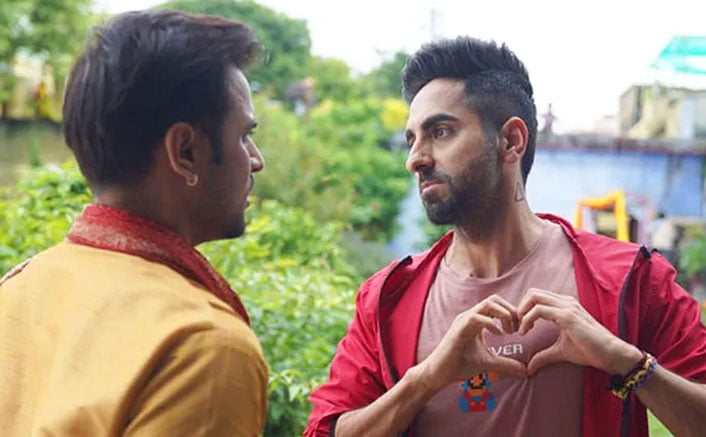Shubh Mangal Zyada Saavdhan is a significant stride in the right direction. In 2020, when Bollywood continues to live in a bubble of rampant misogyny, homophobia, racism, tired stereotypes, and dated tropes; films with representation of overlooked minorities become essential, especially to make their experiences and struggles a part of mainstream narrative and discourse.
A film about two gay men who unwittingly come out to their homophobic families, Shubh Mangal Zyada Saavdhan makes a considerable effort, not only to bring to light the experiences of millions of LGBTQIA+ people and the abuse and violence they are subjected to, even within their homes; but it also contributes in revolutionising an industry which often only tells the stories privileged, male, upper-class, savarna folks.
There are very few films with queer depiction in the mainstream and even fewer mainstream films about gay men, and while the film should be lauded for this, it isn’t without flaws. The film lacks nuance and feels rushed at times, and in places it falls back on tired tropes, for instance, homosexuality making a homophobe physically sick.
Though a little late, the fact that this film has been allowed to exist in a homophobic society and wasn’t cut down to its bones to be palatable to bigotry is a huge step up and may finally indicate that we are headed in the right direction.
Though a little late, the fact that this film has been allowed to exist in a homophobic society and wasn’t cut down to its bones to be palatable to bigotry is a huge step up and may finally indicate that we are headed in the right direction. The film features a protracted kiss between the protagonists and was allowed to release without the scene being cut and still managed to avoid an A rating. This is an exception, considering that the CBFC routinely makes a habit of shoving their archaic and bigoted values down our throats and are the self-appointed guardians of what they deem to be the uniform values of 1.3 billion people. In 2016, a same-sex kissing scene was cut from the film Befikre and another film was given an A rating for being too ‘women-centric’.
Also read: Pati Patni Aur Woh: Bollywood Should Stop Making Rape Jokes Already
The film on the whole, as an entertainer, is a massive disappointment. In what can only be construed as an attempt to provide some humour in a film about a very serious subject, Shubh Mangal Zyada Saavdhan aims for cheap laughs. Most of the film is badly dealt with sex jokes and crass analogies, something that looks straight out of the back pages of a thirteen-year-olds notebook. The humour – if one might call it so – is an abomination and the film is starved for better-writing. Though the film is so-so in terms of being a work of art, it is still of great cultural significance.
The film on the whole, as an entertainer, is a massive disappointment. In what can only be construed as an attempt to provide some humour in a film about a very serious subject, Shubh Mangal Zyada Saavdhan aims for cheap laughs.
Though weak in terms of plot, with a rather cliched and predictable story, the film is exemplary in terms of character. It does not let its protagonists be caricatures, it rejects stereotypes of the flamboyant, theatrical, hyper-sensitive gay man, and instead gives us rather well-rounded characters, who don’t internalise homophobia to be appealing to the audience. In putting thought into its characters, the film avoids the Johar-esque trap of its gay characters being a tangled, distasteful fog of offensive stereotypes. The depiction of Shubh Mangal Zyada Saavdhan’s gay characters forces us to challenge our prejudices about gay men and unlike its predecessors, it doesn’t harm the LGBTQIA+ community.
In 2020, starved for queer-representation in cinema, we should take what we can get, but that isn’t to say that there isn’t room to do way better. Shubh Mangal Zyada Saavdhan being one of the very few LGBTQIA+ films in the mainstream is culturally significant cinema that has the potential to facilitate discourse and a shift in homophobic narratives, the film may also hold the torch to give way for increased LGBTQIA+ representation in cinema and maybe queer-representative films of the future may not find it as hard to toe the line between comedy and nuance.
Also read: Film Review: Fire —On Queering Love And Beyond
Shubh Mangal Zyada Saavdhan is groundbreaking, but it’s only a start. We mustn’t stop demanding increased and nuanced LGBTQIA+ representation in pop-culture. Cinema has always been a tool for profound cultural impact. It is finally time we start to focus on whose stories we are telling and how. Cinema’s toxic tango with bigotry needs to end; films don’t need to be misogynistic, homophobic, racist, and prejudiced to work. Diverse, inclusive and representative cinema is more suited to our times.
Featured Image Source: Koimoi
About the author(s)




